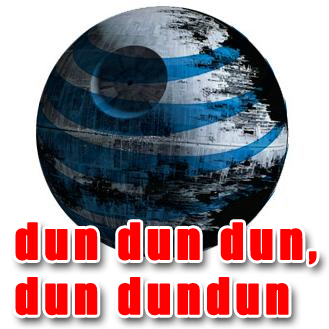 NEWS
NEWS
 NEWS
NEWS
 NEWS
NEWS
![]() November 28 will mark the date that AT&T will start sending out anti-piracy warning notices to its subscribers who get flagged for copyright violations. In the wake of these notices repeated offenders will be sanctioned by having “the access to frequently visited websites blocked,” until such time that they complete a copyright education course. All this, and more, revealed in leaked internal training documents at the US national telecom and Internet service provider.
November 28 will mark the date that AT&T will start sending out anti-piracy warning notices to its subscribers who get flagged for copyright violations. In the wake of these notices repeated offenders will be sanctioned by having “the access to frequently visited websites blocked,” until such time that they complete a copyright education course. All this, and more, revealed in leaked internal training documents at the US national telecom and Internet service provider.
According to an article running in TorrentFreak last year the RIAA and MPAA formed the Center for Copyright Information (CCI) alongside five major Internet providers in the United States including AT&T, Cablevision, Comcast, Time Warner Cable and Verizon. The above internal documents reflect expected policy changes that might arise from this alliance between ISPs and copyright groups.
So far, the only information about these policy changes have come by way of internal document leaks and not official press releases, but what we’re seeing is quite damning for customers:
“In an effort to assist content owners with combating on-line piracy, AT&T will be sending alert e-mails to customers who are identified as having been downloading copyrighted content without authorization from the copyright owner.”
“The reports are made by the content owners and are of IP-addresses that are associated with copyright infringing activities. AT&T will not share any personally identifiable information about its customers with content owners until authorized by the customer or required to do so by law.”
The policy includes a six-strikes provision, as mentioned above, whereupon customers who receive multiple copyright flags will suffer particular punishments. Repeat offenders who attempt to reach certain popular websites will be instead redirected to an educational page. According to the internal documents, in order to lift the ban, AT&T will require these customers to complete an “online education tutorial on copyright.”
And other remedies are also listed in the documents for higher numbers of offenses:
“After the fifth alert, the content owner may pursue legal action against the customer, and may seek a court order requiring AT&T to turn over personal information to assist the litigation,” AT&T explains.
In the past, watchdogs have watched the RIAA and MPAA make shotgun accusations in court using John and Jane Doe suits in against large blocks of anonymous Internet users in order to dragnet for their information based on IP addresses. This behavior has seen some success, but a lot of backlash from the US court system, and it has cost the court system a great deal of money to enable these copyright groups to do this.
Under this new policy, major ISPs themselves would work directly with the RIAA and MPAA to give confidential user information to them based on the nebulous tracking of notices of copyright infringement. It’s unknown exactly how flags for “copyright infringement” will be given to customers—hopefully without violating the privacy of customers or the common carrier status of the ISP—based on what information or gathered from where.
ISP and copyright cartel spying leads to an increase in youth use of VPN
Also mentioned in the TorrentFreak article is that as news of copyright organizations seeking laws in governments, policies with ISPs, and generally caught with unscrupulous investigators seeking infringers that the youth have been looking to protect their privacy online. In fact, UK courts’ moves to block The Pirate Bay has seen a notable increase in the use of encrypted connections to protect privacy.
If ISPs intend to enact a policy that means that they (or someone else) is watching what users do online to determine if they’re violating copyright or not, there may yet see an even greater increase in the use of VPN to simply hide and anonymize online activity from ISPs themselves.
THANK YOU